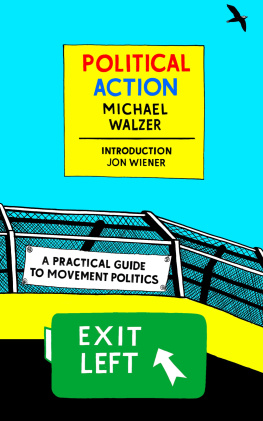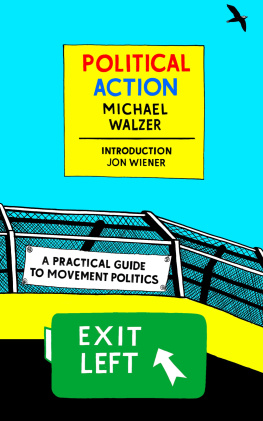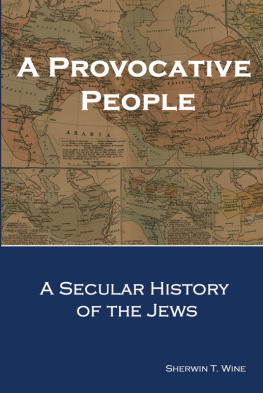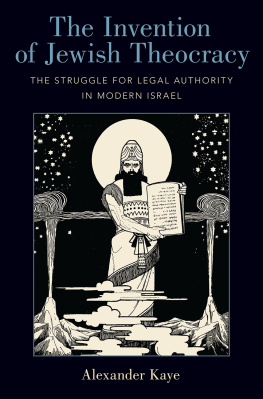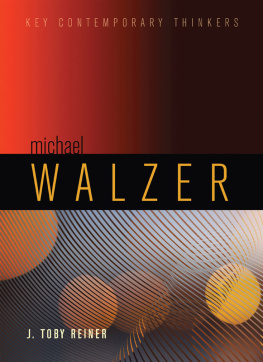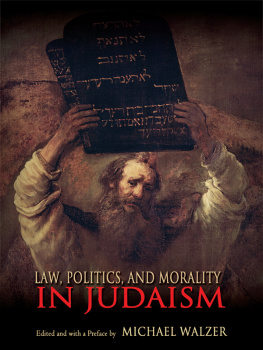The Henry L. Stimson Lectures Series
The Paradox of Liberation
Secular Revolutions and Religious Counterrevolutions
Michael Walzer

The Henry L. Stimson Lectures at the Whitney and Betty
MacMillan Center for International and Area Studies at Yale.
Copyright 2015 by Michael Walzer.
All rights reserved.
This book may not be reproduced, in whole or in part, including illustrations, in any form (beyond that copying permitted by Sections 107 and 108 of the U.S. Copyright Law and except by reviewers for the public press), without written permission from the publishers.
Yale University Press books may be purchased in quantity for educational, business, or promotional use. For information, please e-mail (U.K. office).
Set in Janson type by Integrated Publishing Solutions,
Grand Rapids, Michigan.
Printed in the United States of America.
Library of Congress Control Number 2014031910
ISBN 978-0-300-18780-9 (cloth : alk. paper)
A catalogue record for this book is available from the British Library.
This paper meets the requirements of ANSI/NISO Z39.481992
(Permanence of Paper).
10 9 8 7 6 5 4 3 2 1
To the memory of Clifford Geertz (19262006)
colleague and friend
who would have argued with me about this book
Contents
ONE
The Paradox of National Liberation
TWO
The Paradox Illustrated: Zionism vs. Judaism
THREE
The Paradox Denied: Marxist Perspectives
FOUR
The Future of National Liberation
Preface
My project in this book is to describe a recurrent and, to my mind, disturbing pattern in the history of national liberation. I will discuss a small set of cases: the creation of three independent states in the years after World War II India and Israel in 194748 and Algeria in 1962and I will focus on the secular political movements that achieved statehood and the religious movements that challenged the achievement roughly a quarter century later. In the first chapter, I will refer to all three liberation movements the Indian National Congress, Labor Zionism, and the Algerian FLN (National Liberation Front), but chiefly to the FLN. I will also refer, because I have written about it and because it has been a general reference for Western , I will consider an alternative view of all three cases, defended primarily by Marxist writers. And in the fourth chapter, I will take up a second alternative view, developed by Indian writers in postcolonial studies, and then ask whether national liberation has a future, looking first and most extensively at India and then, again, at Israel.
I wont pretend that the pattern I am going to describe is universal or that it is precisely the same in all its iterations. I follow the maxim about political life that nothing is the same as anything else, but that some thingsevents, processes, movements, and regimesare similar to other things, and careful comparisons can help us understand the similarities and the differences. Friends and colleagues whom I consulted about my project worried about the extent of the differences and called my attention to this or that outlying case. In India, for example, I was told very emphatically that Algeria was the outlier because of the authoritarian character of the state the FLN established and I have adopted something like that position here. A number of colleagues and early readers argued that the Zionists are the outliers because of the Jewish exile and the initial and ongoing struggle with the Palestinian Arabs. I mean to deal with those issues, but my primary subject is national liberation itself and what I will call, for the moment, its internal relations. Here, as readers will see, the similarities across the three cases are very strong.
It is important to stress that my aim throughout is understanding, not scientific explanation. I make no claim that the three case pattern can be expressed as a set of covering laws; there are historical and contemporary cases that the laws wouldnt cover. Indeed, these three can each be described in ways that would greatly complicate my schematic account. I will supply some of the complications after laying out the general scheme. But I believe that my account, even in its simplest version, provides a useful beginning for a necessary inquiry: What happened to national liberation?
Initially, at least, this is a success story: the three nations were indeed liberated from foreign rule. At the same time, however, the states that now exist are not the states envisioned by the original leaders and intellectuals of the national liberation movements, and the moral/political culture of these states, their inner life, so to speak, is not at all what their founders expected. One difference is central to my analysis, and I will keep coming back to it: all three movements were secular, committed, indeed, to an explicitly secular project, and yet in the states that they created a politics rooted in what we can loosely call fundamentalist religion is today very powerful. In three different countries, with three different religions, the timetable was remarkably similar: roughly twenty to thirty years after independence, the secular state was challenged by a militant religious movement. This unexpected outcome is a central feature of the paradox of national liberation.
The same story could be told with other cases and other timetables. Two very different versions of secular politics made their appearance in the twentieth century. The first version was openly authoritarian: Lenin in Russia and Atatrk in Turkey are its primary representatives; Nasser in Egypt and the Baath parties in Syria and Iraq are later examples of authoritarian secularism. The Algerian FLN could be included in this group; the state that it established immediately after independence allowed only one political party, and even that party was soon taken over by the army it supposedly controlled. But since the FLN was, at the beginning, formally committed to democracy, and since at least some of its militants sustained that commitment, I have chosen to link it with the more consistently democratic examples of India and Israel. The combination of democratic and secularist commitments is, to my mind, critically important to the project of national liberation; it is the key reason for calling the movements I will be discussing liberationist. Or, better, it is my reason for distinguishing them from other revolutionary and nationalist movements, even though some of these others have also been challenged, down the road, by a religious counter-revolution.
All three of the national liberation movements considered here have been attacked as Westernizing by their religious (and also by their postcolonial) critics. The charge is undoubtedly true. In important ways, the liberationists imitate the politics of the European left. Since that is the source of my own politics, the criticism doesnt particularly bother me. But it points to another aspect of the paradox of national liberation: the militants go to school with the very people whose imperial rule they are fighting, and they have a view of their own nation that is remarkably close to what Edward Said called orientalism. That term, like Westernizing, is meant to be pejorative, and yet there is much to be said in favor of the orientalistsand some things also to be said against them. The problematic connection of the national liberation militants to the nation they aim to liberate is central to my argument in the chapters that follow. This is the internal relation that I mean to examine; it goes a long way toward explaining the religious counterrevolution.
Next page

